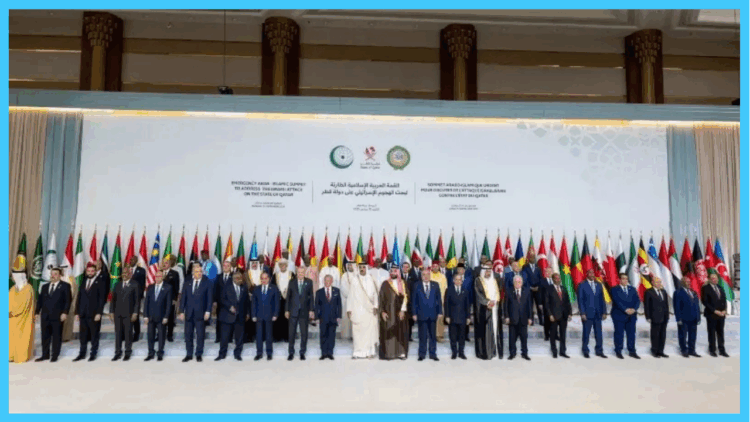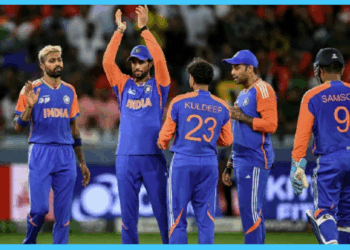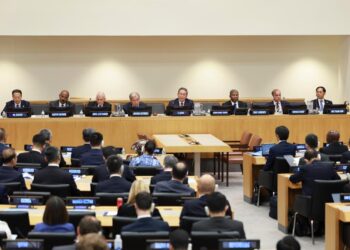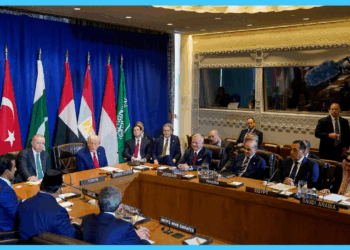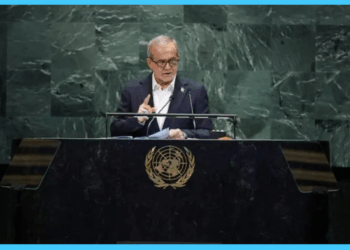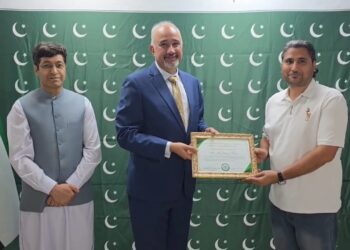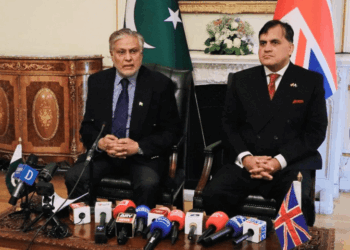By Mian Sohail Iqbal
DOHA; Arab and Muslim leaders on Monday convened in Doha for an emergency summit following last week’s deadly Israeli strike in the Qatari capital that targeted senior Hamas officials. The rare joint meeting of the Arab League and the Organisation of Islamic Cooperation (OIC) drew participation from nearly 60 countries, reflecting a wave of anger and urgency across the Muslim world after the attack that killed five Hamas members and a Qatari security officer.
The summit’s final declaration carried unprecedented language, urging member states to review diplomatic and economic ties with Israel, initiate legal proceedings against it, and consider collective measures to hold it accountable. Leaders demanded urgent steps to stop Israeli aggression not only in Gaza but also against sovereign Arab states, declaring the September 9 strike in Doha as a flagrant violation of Qatar’s sovereignty.
A Collective Outcry Against Israel
The joint statement condemned Israel’s expanding military actions and accused it of deliberately undermining ceasefire efforts by targeting Hamas negotiators on Qatari soil. “All states must take all possible legal and effective measures to prevent Israel from continuing its actions against the Palestinian people,” the declaration read. “This includes reviewing relations with it, pursuing accountability through international courts, and suspending its membership in the United Nations.”
The leaders’ communique went further than previous statements in explicitly calling for Israel’s possible expulsion from the UN, reflecting the heightened outrage across the region. Diplomats noted that while not all states are ready to sever ties, the wording was designed to send Israel and its allies a strong political message.
Qatar’s Emir, Sheikh Tamim bin Hamad Al Thani, opened the summit with fiery remarks. He accused Israel of trying to derail negotiations by striking the very officials involved in ceasefire talks. “Whoever systematically assassinates negotiators has no interest in peace,” he said. In a later message on X, Sheikh Tamim described the emergency summit as “a clear message against Israeli state terrorism” and thanked fellow leaders for their solidarity with Qatar.
The emir also warned that Israeli Prime Minister Benjamin Netanyahu “dreams of turning the Arab world into an Israeli sphere of influence,” calling it a dangerous illusion.
Regional Heavyweights Join Ranks
The Doha summit was attended by several key leaders, including Saudi Crown Prince Mohammed bin Salman, Iranian President Masoud Pezeshkian, Turkish President Recep Tayyip Erdogan, Iraqi Prime Minister Mohammed Shia al-Sudani, and Palestinian President Mahmoud Abbas. Their presence, analysts said, reflected the seriousness with which the region views the attack on Qatar.
President Pezeshkian of Iran, which fought a short war with Israel earlier this year, declared that “tomorrow it could be the turn of any Arab or Islamic capital.” He urged Muslim nations to cut diplomatic ties with Israel, calling it a “fake regime” that thrives on division. “The choice is clear. We must unite,” he told the gathering.
Egyptian President Abdel Fattah al-Sisi, the first Arab leader to formally recognise Israel in 1979, warned that the strike “places obstacles in the way of new peace agreements and even threatens existing ones.” His remarks underscored growing unease in Cairo over the fragility of the peace framework in the region.
Turkish President Erdogan was equally forceful, branding Israel’s conduct as evidence of a “terrorist mentality” and accusing it of carrying out war crimes.
Gulf States’ Balancing Act
The Gulf states that have normalised ties with Israel under the Abraham Accords—namely the United Arab Emirates, Bahrain, and Morocco—sent senior envoys rather than heads of state, signaling a delicate balancing act. While these states have security and economic ties with Israel, they joined the Doha declaration in condemning the attack and calling for accountability.
The Gulf Cooperation Council (GCC), meeting on the sidelines of the summit, urged Washington to use its “leverage and influence” to rein in Israel. Secretary General Jasem Al-Budaiwi told reporters that Gulf countries had agreed to act in unity in defence of Qatar’s sovereignty.
Strains with Washington
The Israeli strike in Doha has also strained US ties with its Gulf partners. Qatar hosts the Al Udeid Air Base, the largest US military facility in the Middle East, and plays a central role as a mediator in Gaza ceasefire efforts.
US Secretary of State Marco Rubio is set to arrive in Qatar on Tuesday to reassure the Gulf state of America’s support. The State Department said he would reaffirm “America’s full support for Qatar’s security and sovereignty.”
The Biden administration, however, has been caught in a balancing act. President Donald Trump initially rebuked Israel, saying he was “very unhappy” about the attack, but later softened his stance. Rubio has already stressed that the strike would “not change the nature of our relationship with Israel.”

Pakistan’s Active Role
Pakistan also played a prominent role at the summit. Prime Minister Shehbaz Sharif called for the creation of an Arab-Islamic task force to counter Israel’s “hegemonic ambitions” and expansionist designs. “This is a flagrant violation of the sovereignty of Qatar,” he said, condemning the attack as a deliberate attempt to sabotage peace in the Middle East.
PM Shehbaz emphasised that the world was witnessing a “massacre in Gaza” and urged immediate steps to halt Israel’s war crimes. He also pushed for suspending Israel’s UN membership, reinforcing the summit’s collective demand.
The Pakistani delegation, which included Deputy Prime Minister Ishaq Dar, Defence Minister Khawaja Asif, and Army Chief General Asim Munir, met Saudi Crown Prince Mohammed bin Salman on the sidelines. Both leaders condemned Israel’s actions and vowed closer coordination.
Dar, who had already participated in the foreign ministers’ preparatory meeting, urged urgent international steps to “safeguard the global order.” He listed concrete measures: holding Israel accountable for war crimes, forming a regional task force, suspending UN membership, and ensuring humanitarian access in Gaza.
Toward a Unified Muslim Stance
The Doha summit highlighted rare unity across Arab and Islamic states, even as political differences linger. From Iran to Saudi Arabia, from Turkey to Egypt, leaders echoed a shared demand: Israel must face consequences for its actions.
The final communique declared unequivocal solidarity with Qatar, condemned Israeli “state terrorism,” and reaffirmed support for Palestinian statehood. It also announced that Arab and Muslim countries would push for a special debate at the UN General Assembly and Human Rights Council. Indeed, the UNHRC confirmed that it would hold an urgent debate on the Qatar strike on Tuesday.
Analysts noted that while the declaration may not immediately alter Israel’s behaviour, it demonstrates a shift: Arab and Muslim states are increasingly willing to leverage diplomatic, legal, and economic tools to pressure Tel Aviv.
A Turning Point?
For many leaders, the attack in Doha crossed a red line by extending Israel’s battlefield into the Gulf. “This was not just an attack on Hamas, but on a sovereign Arab state,” one diplomat said. “It changes the equation.”
By the end of the summit, the message was clear: the Arab and Islamic world, despite differences, would stand united against further Israeli aggression. As Sheikh Tamim put it, the Doha declaration is “a unified voice in the face of terrorism and a step toward coordinated action.”
The coming days will test how far this unity translates into concrete action—whether in the form of diplomatic downgrades, legal proceedings at The Hague, or coordinated efforts at the UN. But for now, Doha has placed Israel under renewed pressure, and the Arab-Islamic bloc has signaled that its patience has limits.








